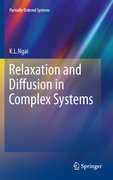
Relaxation and diffusion are general and common phenomena in many branches ofcondensed matter physics, chemistry and materials sciences. In disordered andpartially ordered systems the classes of materials include liquids, colloids,polymers, rubbers, plastic crystals, biomolecules, ceramics, electrolytes, fuel cell materials, molten salts, glasses, and etc. Each class is further subdivided into many different types of materials. For example, glasses vary from metallic glasses, oxide glasses, chalcogenide glasses, polymeric and organic glasses, and each form a separate discipline. In past years research has suffered from undue fragmentation in terms of individual classes of materials. Dr. Ngai was one of the few who recognized the existence of a remarkable universality of relaxation and diffusion properties across the diverse classes of materials, and he suggested that some yet undiscovered fundamental physics is behind this universality Beginning in 1979 with the publication of two articles in Comment Solid State Physics, Dr. Ngai launched an interdisciplinary study of relaxation and diffusion that has continued to the present. At this time, experimental evidence of universal behavior are plentiful and well substantiated. Dr.Ngai has also created a theoretical framework to characterize, correlate and interpret these universal properties. This book will be of interest to a largenumber of researchers across many disciplines. Exposes the reader to many different classes of materials and relaxation phenomena A thorough treatment of the Glass Transition Problem With over 1800 references and hundreds of figures,this book collects the results of many experiments and illustrates the universal behavior of relaxation and diffusion in interacting systems INDICE: Introduction.- Universal Relaxation and Diffusion Properties in Complex Systems.- Experimental Evidences.- Computer Simulations.- Theoretical Modeling and Interpretations.- Many-Body Relaxation Dynamic and Relation to Chaos.- Glass Transition and the Glassy State.- Role of Thermodynamics, Volume, Entropy and Temperature.- Polymer Viscoelasticity.- Ionic Conductivity Relaxation in Ionically Conducting Materials.- Relaxation and Diffusion at Nanometer Scales.- Relaxation in Biomolecules.
- ISBN: 978-1-4419-7648-2
- Editorial: Springer
- Encuadernacion: Cartoné
- Páginas: 650
- Fecha Publicación: 29/12/2010
- Nº Volúmenes: 1
- Idioma: Inglés
